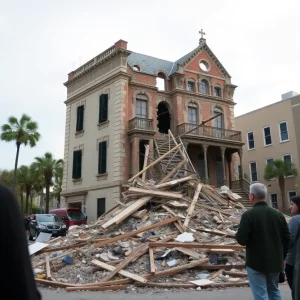Charleston Aims to Provide Temporary Shelters for the Homeless
Charleston is buzzing with excitement and hope as its Mayor, William Cogswell, recently announced a new initiative aimed at tackling homelessness in the area. On October 1, Cogswell unveiled his ambitious plan to construct 118 temporary shelters as part of the Rapid Housing Program, bringing a promising solution to the homelessness crisis that many are facing right now.
The concept is quite straightforward. In simple terms, the plan features an 8-foot by 10-foot cube prototype which serves as a model for what these shelters will look like. This prototype was displayed outside North Charleston City Hall, showcasing a cozy space that includes a bed, some shelving, and a welcoming mat, all designed to create a safe haven for individuals in need.
Now, the project estimates its costs could reach at least $5.5 million in the first year, which is quite a significant amount. But Cogswell believes that spreading the financial responsibility amongst surrounding counties and municipalities will ease the burden on taxpayers, ensuring everyone contributes fairly based on their population size.
A Well-Stratified Proposal
At the heart of Cogswell’s proposal is a 2-acre parcel of city-owned land in the Neck Area, a location ideal for setting up a community of temporary shelters. But it doesn’t just stop there; plans also include establishing a permanent resource center that will house the Hope Center, a daytime support hub offering meals, laundry services, counseling, and job training for the homeless and those at risk of becoming homeless.
During the presentation, which attracted around 100 attendees, including service providers and nonprofit leaders, a mix of excitement and concern was palpable. While many recognized the need for immediate solutions for men—who represent a large portion of the homeless population—others voiced dissatisfaction that the plan primarily focuses on male shelters, leaving vulnerable women and children without a clear path to safety.
As attendees discussed the plan, Denise Marie Fugo, a nonprofit leader, shared her thoughts, asserting that the next community should prioritize securing shelter for women and children. This sentiment was echoed by other attendees who worry about the broader implications of focusing solely on men.
Addressing Concerns
In response, Cogswell assured everyone that the prevailing idea is that by providing shelter primarily for men, it would alleviate some of the pressures on existing facilities, allowing those spaces to better serve families and women. The initiative plans to accept men referred by verified partners, including law enforcement and local nonprofits.
The urgency of this plan has grown even more apparent when you consider the numbers. In a point-in-time count conducted earlier this year, volunteers recorded **484 unhoused individuals across the area**, but many believe that this figure does not capture the full extent of the matter.
Not-too-distantly, reports indicated that nearly 600 students within the Charleston County School District were living in hotels due to familial displacement. It’s evident that this ‘band-aid’ approach, as one attendee described it, is just one piece of a larger puzzle. Many advocates push for broader solutions, emphasizing affordable housing, to truly tackle the root of homelessness.
Next Steps for Charleston
Mayor Cogswell’s vision extends beyond merely addressing immediate shelter needs; he envisions creating a permanent 8,000-square-foot building on-site to house various nonprofits and organizations. This space would operate 24/7 to streamline shelter management, with facilities that would allow for a full range of services, including hot meals, laundry, and counseling.
Funding remains a primary concern, and while the city has already earmarked $1 million for shelter purchases, many local leaders have yet to formally commit to supporting this plan. As various municipalities decide whether to participate, Cogswell hopes to see resolutions of support by December, projecting to open temporary shelters by July 2025, with a permanent facility operational by 2026.
Charleston and its surrounding areas face a crucial decision—do they want to band together to tackle homelessness effectively, or will they leave it as a responsibility for the few? The upcoming months promise to be pivotal as leaders weigh their options and the community continues to rally for support.



























